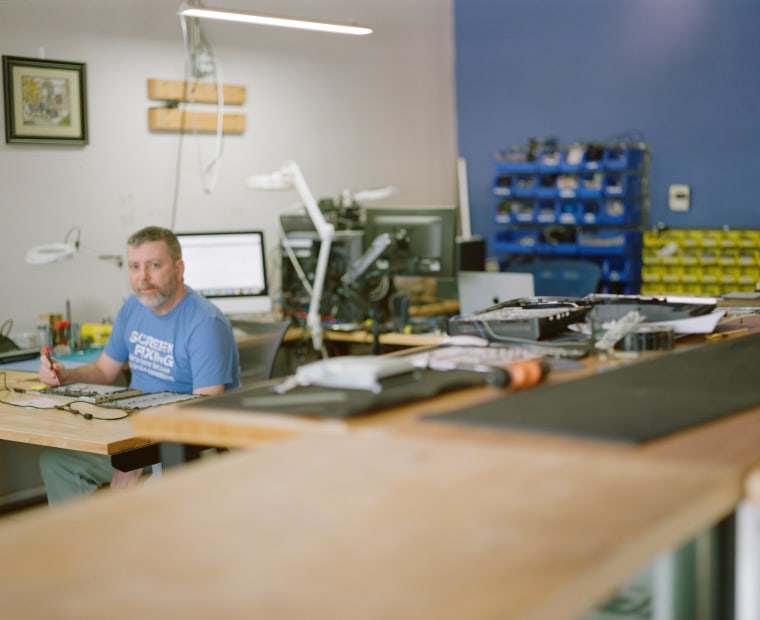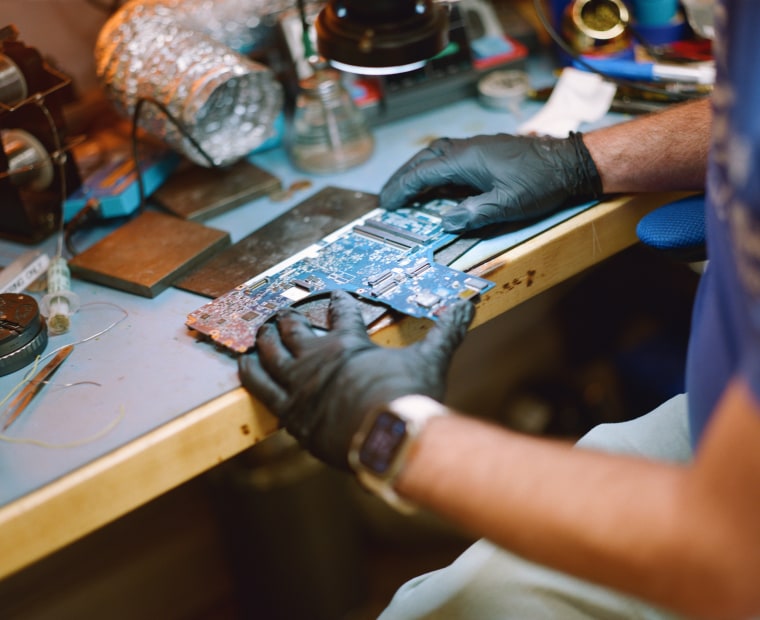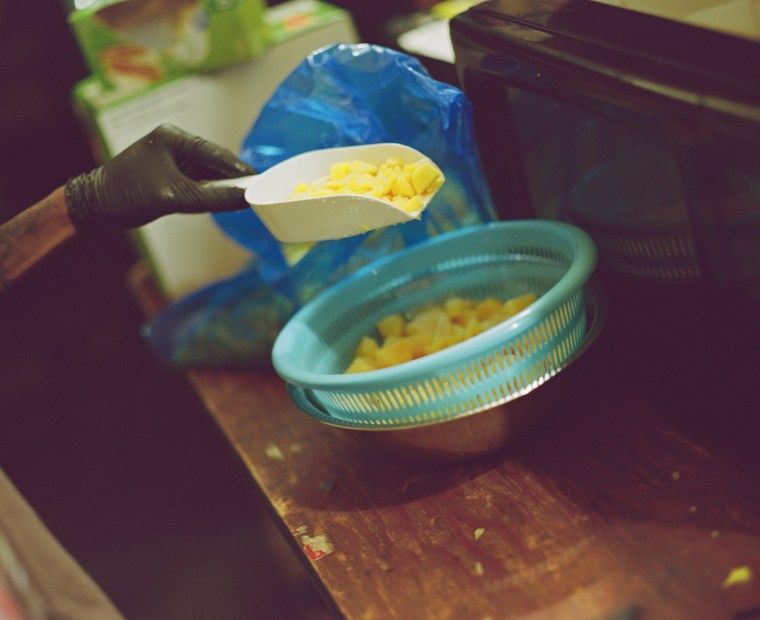ATLANTA — Nate Minor doesn’t want to slash his workers’ health benefits to pay for HDMI ports, but he’s afraid he might have to.
The owner of a device repair shop called ScreenFixing, Minor has weathered the past decade’s upheavals pretty well. Despite the pandemic and the inflation roller coaster, he expanded his services from fixing phones to doctoring up laptops and gaming consoles, too. Sales have grown 10% to 15% per year, and he’s made enough money to offer all four of his employees health insurance.
But President Donald Trump’s expanding trade war threatens those gains, Minor said, especially the 145% tariffs on goods from China, where his supplier sources nearly all the screens, microchips and other gadget parts ScreenFixing relies on. Trump recently exempted consumer electronics from import taxes but said the reprieve would be temporary, and his administration is already preparing fresh tariffs on chips.

“It might become a situation where we have to source more parts directly from Apple,” said Minor, who’s also the president of the East Atlanta Business Association. “Compared to aftermarket parts, they’re going to cost significantly more.”“Some people say, ‘Hey, you’ve got to go through the hard to get to the good,’ but that’s not what this is,” he said. “This is going to put people out of business.”
Trump’s scattershot tariff rollout has unmoored Wall Street and corporate leaders in recent weeks, but it’s also rattling small-business owners who are struggling to plan around the chaos. Small businesses’ outlooks soured in March, the National Federation of Independent Business reported Wednesday, and a group of five owner-operated companies sued the administration last week seeking to block some levies.
“The implementation of new policy priorities has heightened the level of uncertainty,” NFIB chief economist Bill Dunkelberg said in a statement. “Small business owners have scaled back expectations on sales growth as they better understand how these rearrangements might impact them.”

The anxiety is palpable in East Atlanta Village, a tight-knit community of local storefronts in a city known for its entrepreneurialism and anchored by headquarters for Home Depot, UPS, Delta Air Lines and other major brands.The district — just a few square blocks southeast of where I-20 meets bustling Moreland Avenue — draws a diverse crowd of young people to restaurants, late-night music venues, tattoo parlors and a newly opened comic book shop. Operators in the area are proud of their indie status; some grumbled when a national cookie chain opened in their midst a few years ago.
“Not all of us have been wiped out by Amazon and Walmart, you know,” said Park Pet Supply owner Victoria Park. “Main Street is still here.”
But Park and other local business owners said they’re still regaining their footing from inflation and now worry the trade war will make it harder to compete for increasingly value-conscious shoppers. Park Pet Supply sells about 6,500 items ranging from natural pet foods to grooming products and training accessories, many of which are sourced from Canada.

“One day we’re having tariffs, the next day we’re not having tariffs, and the next day we’re having tariffs. Then, ‘Oh no, we’re going to do 25% — no, we’re going to do 50%,’” she said. “That’s very, very hard for small businesses to navigate when you’re constantly changing things.”
If the customers can’t get what they want when they come here, they’re going to find it somewhere else.
Victoria Park, Owner of Park Pet Supply
Park said she bought $1,000 worth of backup stock from her Canadian suppliers in January, up from her usual $300quarterly order, hoping to get ahead of Trump’s 25% tariffs on many goods from north of the border that took effect in March. She said she’s already seen price increases on more than 20 types of pet food, along with hikes on toys and collars, and fears having to shrink her assortment.“If the customers can’t get what they want when they come here,” Park said, “they’re going to find it somewhere else,” like Chewy or PetSmart.
A White House spokesperson didn’t respond to a request for comment.
Nearly a third of independent businesses in Georgia have already experienced significant or moderate price increases from tariffs, according to a first-quarter survey of 700 such companies by the Atlanta-based nonprofit group Access to Capital for Entrepreneurs.
“Many of these small businesses, but not all, run on small margins in terms of cash flow,” said Martina Edwards, ACE’s president and CEO. “They are balancing between what you pass on to the consumer or not.”

Atlanta boasted the second-most new business applications, behind only Las Vegas. But the Trump administration’s trade policies are making it harder to recruit companies to the area, said Jerry Parrish, chief economist at the Metro Atlanta Chamber.
At the end of the day, that’s what Trump is trying to do — force people to import less and find options that are local.
King Shands, owner of East Atlanta Treehouse
“We’ve heard from some of the companies we’re dealing with that, ‘Hey, I’m just going to wait to see what happens,’” he said. “Some of those purchases that people would have made, some of those investments that people would have made, some of that hiring they would have done — just keeps getting postponed further and further, and that’s going to drag on our growth.”Some business owners in East Atlanta Village aren’t too distressed.
If imported fruits and vegetables become drastically more expensive, “then we would have to further adjust our prices and try to find more local options,” said King Shands, who runs East Atlanta Treehouse, a smoothie shop that turns into an event space at night.
“At the end of the day,” he said, “that’s what Trump is trying to do — force people to import less and find options that are local.”

Down the street is Ten ATL Bar & Lounge, which offers hookahs and live jazz. Co-owner Joe Seymour said he expects to pay more for wine and spirits after Trump slapped 20% tariffs on the European Union, a top booze exporter, before he temporarily substituted it for a 10% across-the-board rate.But Seymour, too, is keeping calm. He plans to tweak some of his prices but is counting on his clientele to stick around.
“I can’t be flustered because, as an urban business, [as] Black people, that’s our life,” he said, adding that his 10-year-old bar has endured Covid and a cycle of gentrification that white flight and disinvestment laid the groundwork for decades earlier. “You’re either going to deal with it or you’re not.”

For Micki Silvestros, dealing with it means “trying to find secondary and tertiary vendors so that I don’t have all my eggs in one basket.”
The tariffs are directly affecting me being able to purchase materials. ... There’s absolutely nothing I can do about it.
Micki Silvestros, owner of East Atlanta Copy CEnter
Silvestros owns a print shop called East Atlanta Copy Center, which also houses her graphic design business, Catalyst Studioz. She said her main vendor has been notifying her lately of cost increases for everything from copy paper to spiral binding coils and laminate rolls, forcing her to shift focus from expanding her business to resetting her sourcing.National chains may be able to “take that print shop as a loss center, just so that they can get people in to buy the office supplies,” Silvestros said, but that’s not her business model. “Nobody walks into a big-box store with the intention of printing a project and expecting to get one-on-one customer service” like the kind she can offer, she said.
Silvestros recently bought a commercial building in the area, a milestone after 25 years of renting. But materials costs swelled as she waited for permits to renovate, ultimately doubling the project’s budget.

She was delighted in early April when lumber was exempted from Trump’s tariffs on Canada — only to learn days later that the Commerce Department was taking steps to raise duties on Canadian softwood to 34.5% from 14.5% currently.Early last week, Silvestros decided to bite the bullet and start the remodeling work.
“The tariffs are directly affecting me being able to purchase materials for the construction,” she said. “There’s absolutely nothing I can do about it.”

